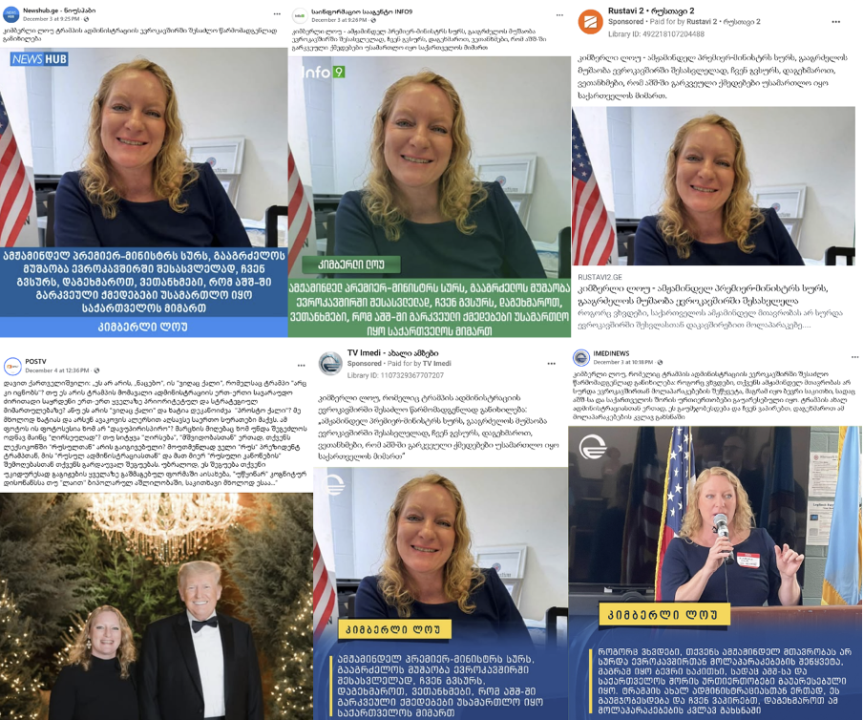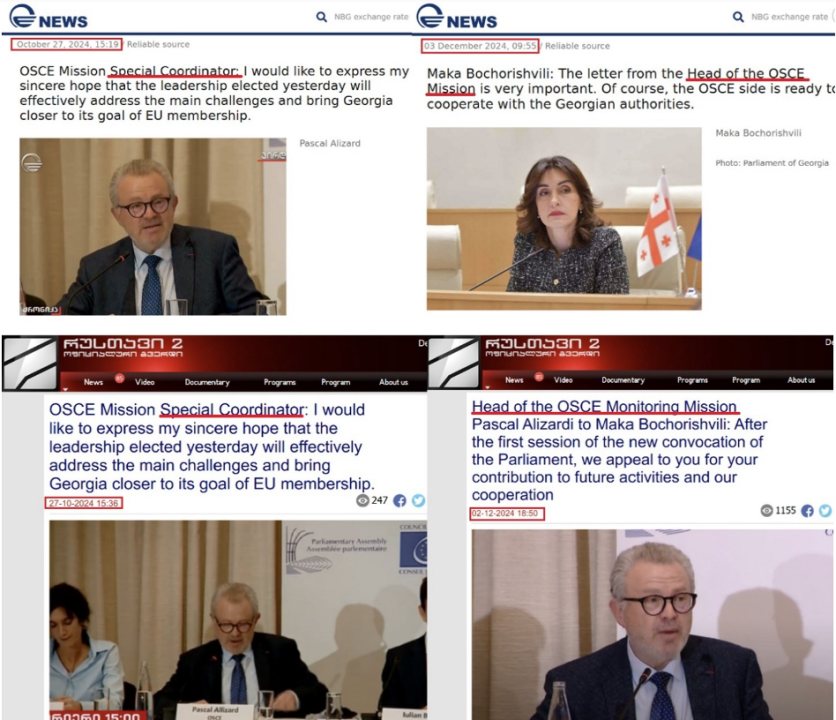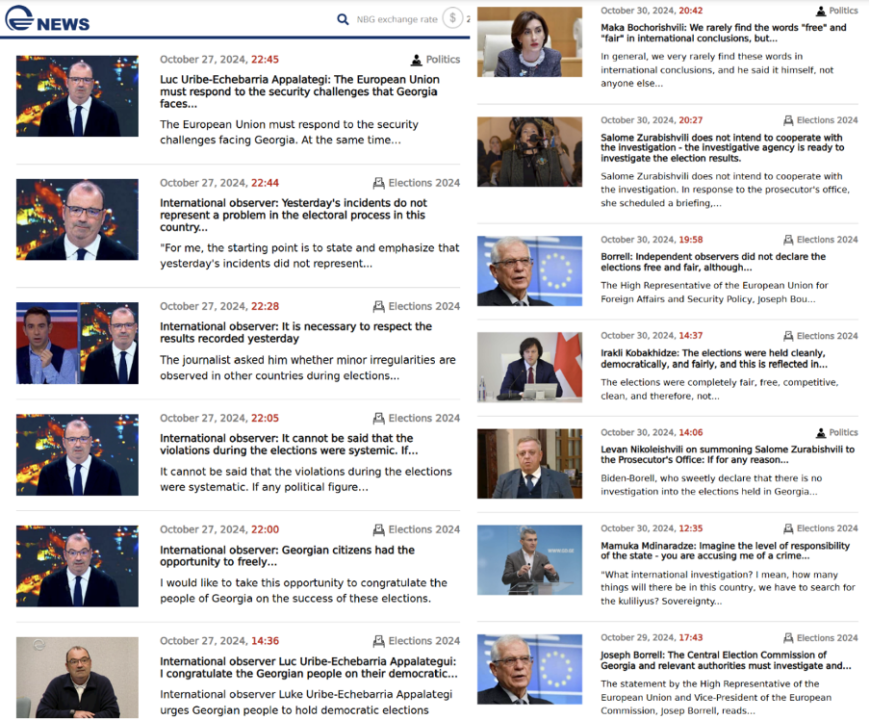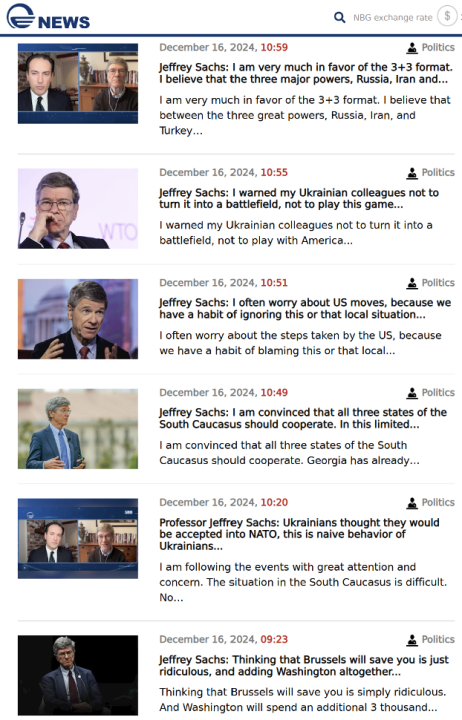Georgian Dream exploits Western politicians and commentators for its propaganda goals
Government propaganda selectively quotes Western politicians and distorts affiliations to portray them as high-ranking figures supporting Georgian Dream
Georgian Dream exploits Western politicians and commentators for its propaganda goals

Banner: Journalists at Imedi TV get ready for a live broadcast in Tbilisi, Georgia, December 12, 2007. (Source: Reuters//David Mdzinarishvili)
Amid the mass anti-government protests in Georgia following Prime Minister Irakli Kobakhidze’s November 2024 announcement that Georgian Dream (GD) had paused the EU accession process until 2028, government propaganda engaged in weaponizing statements from Western commentators and politicians. The method involves either relying on controversial anti-liberal Western actors to counter mainstream Western criticism, or manipulating affiliations, as well as selective coverage of statements favorable for Georgian Dream propaganda.
On October 26, 2024, Georgia held critical parliamentary elections, marred by widespread allegations of fraud documented by both local and international election observation missions. The US and the EU stated about the importance to investigate the fraud allegations thoroughly. Tensions in Georgia escalated further when the GD opened the first session of the new parliament on November 25, despite opposition parties boycotting the election results and refusing to take their parliamentary seats. On November 28, the one-party parliament approved a new cabinet of ministers led by Irakli Kobakhidze. The same day, Kobakhidze announced the suspension of EU accession negotiations until 2028 and a refusal of EU budget grants.
This decision prompted tens of thousands of people to take to the streets in protest, which was met with illegal dispersals, detentions, physical abuse, and brutal targeting of activists and journalists by police, masked violent groups, and special forces. At the time of writing, no police representatives have faced prosecution for the ill-treatment and excessive use of force against demonstrators. The Georgian Young Lawyers’ Association (GYLA) condemned the growing police brutality, increasing repression, and systemic human rights violations, going so far as to classify them as potential crimes against humanity under Article 7 of the International Criminal Court (ICC) Statute.
The non-recognition of election results has left GD in increasing international isolation. Aiming to serve as a symbol of Western recognition for Georgia’s domestic and international legitimization, Hungarian Prime Minister Viktor Orbán visited Georgia in late October 2024. His visit was heavily promoted by pro-government TV channels and websites, portraying it as evidence of GD’s European ties. Orbán’s visit, as well as amplifying Western anti-liberal actors, aligns with GD’s years-long campaign that mirrors anti-EU narratives of pro-Kremlin and far-right actors in Georgia. It claims that the European Union is divided into two Europes: one that allegedly opposes traditions and religion, and another—”Orbán’s Europe”—that upholds family values, traditions, and an anti-liberal stance. By promoting this narrative, GD aims to position itself not as opposing Georgia’s European future but as aligned with a conservative, so-called traditionalist vision of Europe.
The alleged US diplomatic appointee who hasn’t been nominated for anything yet
On December 3, the Georgian Public Broadcaster, known for its explicitly pro-government editorial stance, aired an interview with Kimberly Lowe, presenting her as a potential candidate to represent Donald Trump’s incoming administration as ambassador for the European Union. During the interview, Lowe criticized current US policies toward Georgia as unfair and suggested that a new Trump administration would improve US-Georgia relations.
This interview was widely disseminated on pro-government Facebook pages. One of the cards by TV Imedi portrayed Lowe as a potential diplomatic appointee and highlighted her statement: “Your current government did not want to halt negotiations with the European Union, but there were many issues where relations between the US and Georgia had deteriorated. With the new Trump administration, this will improve, and we intend to help you reopen these negotiations.” POSTV even shared a picture of Lowe with Trump, amplifying it with a quote from Davit Kartvelishvili, a member of People’s Power, a Georgian Dream offshoot party. Kartvelishvili claimed that Lowe is “one of the likely main pillars of the next Trump administration in one of the most priority and strategic directions.”

This campaign immediately faced criticism from civil society and activists, who labelled it as a clear government propaganda effort. Reputable media outlets and local fact-checking organizations conducted thorough investigations into Kimberly Lowe’s background. Myth Detector reported that in 2022, Lowe attempted to run for a US House of Representatives seat but was disqualified due to insufficient signatures and errors in her filing. Following the exposure of the propaganda campaign, Lowe responded by denying that she had ever told the Georgian reporter that she had worked for the Trump administration. She also claimed that parts of her interview were inaccurately translated.
This campaign aligned with Georgian Dream’s broader propaganda strategy, which portrays the incoming US presidential administration as likely to reset US-Georgia relations.
From special coordinator to head of mission
In another example, GD propaganda exploited remarks by Pascal Allizard, who was promoted by government and government affiliated media as the head of the OSCE observation mission in Georgia. On December 2, during a press conference, Irakli Kobakhidze said that Pascal Allizard sent a letter to the GD-appointed Minister of Foreign Affairs, which he described as yet another “proof that the elections are recognized, the elections were held properly, and all speculations are groundless.”
The letter was widely circulated by pro-government media and Facebook pages. Georgian Dream claimed the letter counters “unfair assessments” of the elections, asserting that the OSCE recognized the legitimacy of the parliament and government. However, Katya Andrusz, spokesperson for the OSCE/ODIHR, told Civil.ge that Pascal Allizard is neither affiliated with ODIHR nor represents the organization.
Pascal Allizard served as the special coordinator of the OSCE and head of the short-term observation mission during Georgia’s parliamentary elections. Netgazeti, a reputable Georgian online media outlet, provided extensive reporting on Allizard and how his affiliations were portrayed in government-affiliated media. Interestingly, on October 27, the day after the parliamentary elections, government-affiliated outlets described Allizard accurately as the special coordinator of the short-term mission. However, amid mass protests, his role was framed with more elevated and representative title to better align with the Georgian Dream government’s messaging on international recognition.

Selective coverage as a propaganda tactic
Amid mass fraud allegations, government propaganda selectively reported on international assessments of the election process and results. Government-affiliated TV channels extensively covered election observers who opposed the mainstream Western stance, while limiting reports on critical statements.
For instance, on October 27, TV Imedi published six headlines featuring comments from election observer Luke Uribe-Etxebarria Apalategi, a member of the Spanish Senate from the Basque Nationalist Party. One headline read, “International observer: it cannot be said that the violations in the elections had a systemic character. If any political figure declares this, it means that he does not respect the Georgian people and their electoral will.” Another article highlighted his statement that “Georgian citizens had the opportunity to vote freely, and this election process was conducted with a new electronic system, the smooth operation of which was guaranteed.”
In contrast, between October 27 and October 30, TV Imedi published only two headlines quoting Joseph Borrell, the High Representative of the Union for Foreign Affairs. One headline featured Borrell’s October 29 statement, in which he called for a transparent inquiry of “”irregularities, pressure, and intimidation on voters impacting public trust in the process.” Another one was reporting on Borrell’s press conference on October 30. Following Borrell’s statement, however, TV Imedi published five articles reporting on Georgian Dream leaders denouncing Borrell’s call for an international investigation.

Amplifying controversial Western figures to justify shift in foreign policy
The government propaganda also used the same tactic to justify its foreign policy shift with the mouth of western academics and experts. For example, on December 15, TV Imedi aired an interview with American scholar and analyst Jeffrey Sachs, who has been increasingly criticized in the West and Ukraine for his amplification of Russian narratives.
In an interview with TV Imedi Sachs endorsed the Russia-supported 3+3 format as an opportunity for dialogue and sustainable development in the South Caucasus. The 3+3 format was introduced in 2020 and envisions cooperation among the three South Caucasus states—Armenia, Azerbaijan, and Georgia—and three major regional powers—Iran, Russia, and Turkey—as a platform for regional collaboration. Prior to the parliamentary elections, Russian Foreign Minister Sergey Lavrov said on October 18 that “doors are open for Georgia” to join the initiative. Georgia’s participation in 3+3 format would mean isolation from the West and multiple national security risks.
On December 15, following Jeffrey Sachs’ interview, TV Imedi amplified his statements by publishing six Facebook posts within an hour and fifteen headlines on their website by December 16. Sachs claimed that “playing America’s games” turned Ukraine into “Europe’s Afghanistan.” He also stated that Georgia needs “foresight, caution, and proper diplomacy” and not NATO, echoing Georgian Dream’s justification for their foreign policy shift, which the party frames as a “pragmatic policy.”

Georgian Dream used the interview to justify shifts in foreign policy. On December 16, Parliament Chairman Shalva Papuashvili cited Sachs’ comments, arguing that Georgia’s foreign policy reflects a necessary and careful approach. “We know that Georgia needs to be careful, and that’s why we are acting like this. We also hoped that our foreign partners and friends would come to us with such a position,” – Papuashvili said.
In the past two years, government-affiliated channels have regularly amplified statements from far-right, anti-liberal, or pro-Russian Western politicians. The DFRLab documented the same tactic in 2023 when government propaganda channels amplified controversial MEPs during mass protests against foreign agents law, who justified the legislation and accused the West of meddling in Georgia’s internal affairs. The tactic of leveraging Western politicians and commentators is not new, and mirrors methods long employed by the Kremlin to amplify its messages and agenda in Western audiences.
Cite this case study:
Sopo Gelava, “Georgian Dream exploits Western politicians and commentators for its propaganda goals,” Digital Forensic Research Lab (DFRLab), January 7, 2025, https://dfrlab.org/2025/01/07/georgian-dream-exploits-western-politicians-and-commentators-for-its-propaganda-goals/.

